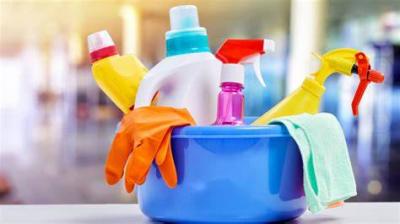Pollution Prevention at Home
Chemical Use & Storage
We use hazardous chemicals in our everyday lives and store them in our homes, products such as paints, aerosols, cleaners, or batteries. Here are some tips for the best use and storage of these items:
- Purchase products in only the necessary amounts to limit having unused product.
- Properly store products indoors in dry, cool areas without risk of chemicals mixing or children obtaining them.
- Some items dropped off at the Midwest City Household Hazardous Waste Facility are eligible for reuse – a free community service available to any resident. Help your community by storing items properly to ensure they are fit to be reused!
- Clean paint brushes in a sink or container, not outdoors on the ground. Water-based paint washed from brushes or hands is safe to go down the sink drain. Items covered with oil-based paint are considered flammable and should be brought to the Midwest City Household Hazardous Waste Facility.
- Use phosphate-free soaps or laundry detergent to prevent the appearance of the plant-growing nutrient phosphorous in natural waters in the event of a sanitary sewer overflow.
- Purchase and use non-toxic, biodegradable, and recyclable products whenever possible for more earth-friendly options.
Sewer Maintenance
Sewage trouble is a mess that no one wants to deal with, whether it’s a leak from the washing machine or a clogged toilet. Here are some tips to keep your home and sewer lines in tip top shape:
- Stop and repair a sewage leak coming from your home’s outdoor cleanout as quickly as possible to prevent a public and environmental health hazard. Whether leak goes directly into the creek or indirectly mixes with stormwater runoff, some of the hazardous effects include: 1) bacteria, ammonia, and phosphorus levels increasing, 2) appearance of detergents in the water, 3) dissolved oxygen levels decreasing, 4) excessive growth of algae and aquatic plants, and ultimately 5) death of fish, plants, and other wildlife.
- Be mindful about what goes down your sink drain as cooking oils, grease, and large amounts of solid foods can cause clogs. Throw solid items in the trash and take cooking oil or grease to a local disposal facility, such as the Midwest City Household Hazardous Waste Facility.
- Flush responsibly, as items such as wipes (even ones advertised as flushable), diapers, paper towels, and cat litter can clog a sewer line or septic system and potentially damage components. Throw these solid items in the trash instead.
- Septic systems should be inspected by a professional at least every three years and pumped as necessary (usually every three to five years). Care for the septic system drain field by not driving or parking vehicles on it. Only plant grass over and near the drain field to avoid damage from roots.
Pool Maintenance
If you have your own pool or spa at home, there are some environmental hazards to be aware of when it comes to the treated pool water. Please be mindful of how to handle treated pool water with these tips:
- Stop and repair any leaks quickly to prevent treated pool waters from running into the street or stormwater sewer system. Treated pool waters contain a variety of chemicals, such as chlorine, bromine, and salts that may be safe to swim in, but are harmful to natural waters, fish, and wildlife. Please help protect the environment by preventing pool discharges.
- If your pool or spa is treated with chemicals, you can quickly drain them into the sanitary sewer system by pumping or siphoning the water into a cleanout or indoor drain. With the required permit, you could also connect a discharge line from your pool directly to the sanitary sewer.
- If your pool or spa becomes dechlorinated naturally over time (by allowing the water to sit untreated for at least 10-14 days), then you can gradually drain it in your yard. The drain area and amount must be able to contain the discharge without any runoff onto neighboring properties or the street.
- Be sure to keep pool chemicals properly stored indoors or in a storage cabinet to stay cool, dry, and out of reach of children or pets. Old or unwanted pool chemicals can be brought to the Midwest City Household Hazardous Waste Facility.

